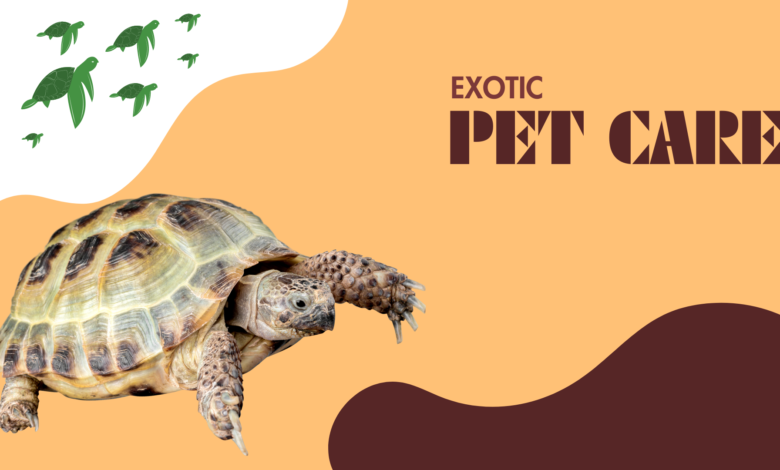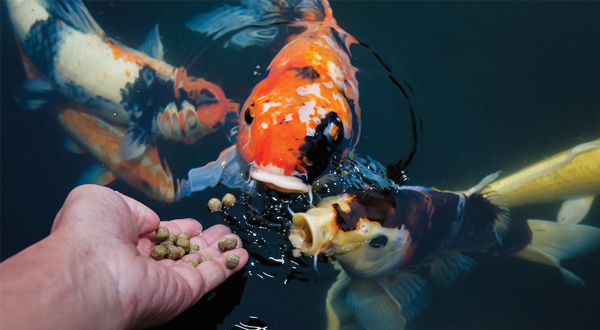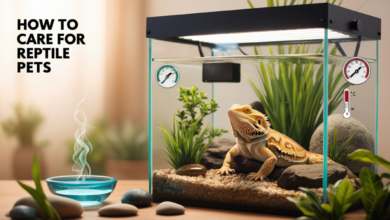Comprehensive Guide to Caring for Exotic Pets

Comprehensive Guide to Caring for Exotic Pets
Discover essential tips and insights for caring for exotic pets. Learn about different types of exotic pets, their unique needs, and how to ensure they thrive in your care.
Introduction to Exotic Pets:
What Are Exotic Pets?:
Exotic pets are animals that are not typically kept as household pets. Unlike cats, dogs, or hamsters, exotic pets include species like reptiles, amphibians, birds, fish, and even invertebrates. These animals often come from environments vastly different from our homes and require special care to thrive in captivity. Exotic pets can range from the small and manageable, like a leopard gecko, to the large and complex, like a macaw or a boa constrictor.
Why People Choose Exotic Pets:
People choose exotic pets for various reasons. Some are fascinated by these animals’ unique beauty or behaviors, while others are drawn to the challenge of meeting their specific care needs. Exotic pets can also be less conventional, offering a distinct companionship experience compared to traditional pets. For many, the appeal lies in owning an animal that stands out and has a particular rarity or mystery.
Types of Exotic Pets:

- Reptiles (Snakes, Lizards, Turtles):
Reptiles are among the most popular exotic pets. They include snakes, lizards, and turtles, each with unique care requirements. For example, snakes like ball pythons are known for their docile nature, while lizards like bearded dragons are interactive and relatively easy to care for. Turtles, especially aquatic species, require well-maintained tanks with proper filtration and basking areas. - Amphibians (Frogs, Salamanders):
Amphibians, such as frogs and salamanders, are also popular among exotic pet enthusiasts. These creatures thrive in highly humid environments and need diets that often include live insects. Frogs like the African bullfrog are known for their size and appetite, while salamanders like the axolotl are famous for their unique appearance and regenerative abilities. - Birds (Parrots, Cockatiels, Finches):
Exotic birds like parrots, cockatiels, and finches are known for their vibrant colors and, in some cases, their ability to mimic human speech. These birds require large cages, mental stimulation, and social interaction to stay healthy and happy. Parrots, in particular, are highly intelligent and can form strong bonds with their owners, but they also need considerable attention and care. - Mammals (Ferrets, Hedgehogs, Sugar Gliders):
Exotic mammals include animals like ferrets, hedgehogs, and sugar gliders. Ferrets are playful and curious, often requiring ample space to explore. Hedgehogs, with their spiny coats, are relatively low-maintenance but need specific temperatures to stay healthy. Sugar gliders are small, nocturnal marsupials that require a specialized diet and plenty of social interaction, making them more demanding than other small mammals. - Fish (Freshwater, Saltwater):
Exotic fish can range from the colorful and easy-to-care-for betta fish to the more complex and challenging saltwater species like clownfish and corals. Freshwater tanks are generally easier to maintain, while saltwater tanks require careful water chemistry and temperature monitoring. Aquariums need to be set up with the appropriate filtration, lighting, and décor to mimic the fish’s natural habitats. - Invertebrates (Tarantulas, Scorpions):
Invertebrates such as tarantulas and scorpions are fascinating exotic pets that require minimal space but specific environmental conditions. These creatures can be captivating to watch and study, though they are often more for display than handling. Tarantulas, for example, need a warm, humid environment and a diet of live insects, while scorpions require a similar habitat but are generally more solitary.
Understanding the Needs of Exotic Pets:
- Habitat Requirements:
Each type of exotic pet has its habitat requirements. Reptiles often need terrariums with controlled temperature and humidity levels, amphibians require moist environments, and birds need large cages with plenty of space for movement and enrichment. Fish tanks must be carefully managed to maintain water quality, and invertebrates often require specific substrates and hiding spots. - Diet and Nutrition:
Feeding exotic pets can be complex, as their diets vary widely. Reptiles may need a combination of live insects and vegetables, birds require a balanced diet of seeds, fruits, and pellets, and amphibians often eat live food like crickets or worms. It’s essential to research the specific dietary needs of your exotic pet and ensure they receive the correct nutrients, including any necessary supplements or vitamins. - Health and Veterinary Care:
Exotic pets often need specialized veterinary care, as not all vets are trained to handle their unique health issues. Regular check-ups are crucial to catch any potential problems early. Health concerns can vary from nutritional deficiencies to respiratory infections, and prompt treatment is essential. Finding a veterinarian experienced with exotic pets is vital for maintaining their well-being. - Socialization and Behavior:
Understanding the behavior of your exotic pet is critical to providing the best care. Some animals, like parrots, are highly social and require regular interaction, while others, like many reptiles, are more solitary. Recognizing signs of stress, such as changes in appetite or behavior, can help you address issues before they become serious. Socialization practices vary depending on the species, but they all aim to ensure the pet is comfortable and healthy in its environment.
Legal Considerations and Responsibilities:
- Legal Requirements for Owning Exotic Pets:
Before acquiring an exotic pet, you must check your area’s legal requirements. Some species may be illegal to own without special permits, while others might be banned entirely. These laws exist to protect both the animals and the environment, as some exotic species can become invasive if released into the wild. - Ethical Responsibilities:
Owning an exotic pet comes with ethical responsibilities. These animals often have specific needs that must be met to ensure their well-being. It’s crucial to consider whether you can provide the proper care before bringing an exotic pet into your home. This includes understanding their life span, habitat needs, and any potential challenges you may face. - Permits and Documentation:
In some cases, owning an exotic pet requires permits and proper documentation. This is particularly true for species that are endangered or protected by law. Ensuring you have all the necessary paperwork is vital to avoid legal issues and demonstrate your commitment to responsible pet ownership.
Setting Up the Ideal Habitat:
- Choosing the Right Enclosure:
The enclosure is one of the most critical aspects of caring for an exotic pet. It must be spacious enough to allow the animal to move freely and be equipped with appropriate features, such as branches for climbing or water features for aquatic species. The size and type of enclosure will vary depending on the pet’s species and size. - Temperature and Humidity Control:
Maintaining the correct temperature and humidity is crucial for many exotic pets. Reptiles, for example, are ectothermic, meaning they rely on external heat sources to regulate their body temperature. Humidity levels are significant for amphibians and some reptiles, as too little or too much moisture can lead to health problems. - Lighting and UVB Needs:
Proper lighting is essential for the health of many exotic pets, especially reptiles. UVB lighting is necessary for reptiles like lizards and turtles to synthesize vitamin D3, crucial for calcium absorption and bone health. Birds also benefit from exposure to natural sunlight or full-spectrum lighting to maintain their health. - Substrate and Enrichment:
The substrate, or the material used on the enclosure’s floor, plays a significant role in the health and comfort of your exotic pet. For example, snakes like coconut fiber or aspen shavings may require a substrate miming their natural environment. Enrichment items, such as hiding spots, climbing branches, and toys, are vital for mental stimulation and preventing boredom.
Feeding and Nutrition:

- Understanding Dietary Needs:
Each exotic pet has specific dietary needs that must be met to ensure their health and well-being. Reptiles, for instance, may require a diet of live insects, vegetables, and occasional fruits, while birds need a mix of seeds, pellets, and fresh produce. Understanding these dietary requirements is crucial for preventing malnutrition and related health issues. - Commercial vs. Live Food:
Feeding your exotic pet can involve a mix of commercial and live food. Many reptiles and amphibians thrive on live prey, such as crickets or mealworms, which provide essential nutrients and mental stimulation. On the other hand, commercial diets are formulated to meet the nutritional needs of certain species and can be a convenient option for many pet owners. - Supplements and Vitamins:
Some exotic pets require supplements or vitamins to stay healthy in addition to their regular diet. For example, reptiles often need calcium and vitamin D3 supplements to prevent metabolic bone disease, while birds may benefit from multivitamins mixed into their food. It’s important to follow recommended guidelines for supplement use to avoid over- or under-supplementation.
Handling and Socialization:
- Safe Handling Techniques:
Handling exotic pets requires care and knowledge to avoid stress or injury to the animal. Some species, like snakes and lizards, may tolerate handling well if done correctly, while others, like tarantulas, should be handled minimally. Learning the proper techniques for your pet is essential for your safety and the animal’s well-being. - Building Trust with Your Exotic Pet:
Building trust with an exotic pet takes time and patience. Many animals, particularly reptiles and birds, can be skittish or aggressive if mishandled. Gentle, consistent interaction can help your pet become more comfortable with you, making handling and care easier over time. - Recognizing Stress and Anxiety:
Signs of stress in exotic pets can vary depending on the species but often include changes in behavior, appetite, or physical appearance. For example, a bird might pluck its feathers when stressed, while a reptile might frequently hide or refuse food. Recognizing these signs early and addressing the underlying causes can prevent more severe health issues.
Common Health Issues:
- Identifying Signs of Illness:
Exotic pets can be prone to specific health issues that may not be immediately apparent. Common signs of illness include lethargy, changes in appetite, abnormal behavior, or physical symptoms like swelling or discharge. Early detection is crucial for effective treatment, so regular observation and familiarity with your pet’s normal behavior are essential. - Preventative Care:
Preventative care is critical to keeping exotic pets healthy. This includes maintaining proper hygiene in their enclosure, providing a balanced diet, and ensuring they receive regular veterinary check-ups. Preventative measures can help avoid common health problems, such as reptile respiratory infections or dietary deficiencies in birds. - Finding an Exotic Pet Veterinarian:
Not all veterinarians can handle exotic pets, so finding one with experience in exotic animal care is essential. Regular check-ups with a qualified vet can help catch any health issues early and ensure your pet receives the best care possible. It’s also necessary to have a vet who can provide emergency care if needed.
Traveling with Exotic Pets:
- Preparing for Travel:
Traveling with exotic pets requires careful planning to ensure their safety and comfort. Whether it’s a short trip to the vet or a longer journey, it’s essential to have a secure, well-ventilated carrier that meets your pet’s specific needs. Ensuring the carrier is the right size and equipped with familiar items can help reduce stress during travel. - Transport Safety:
Safety is paramount when transporting exotic pets. The carrier should be securely fastened during travel, and it’s crucial to maintain appropriate temperature and humidity levels. Avoid direct sunlight or cold drafts, and keep the carrier in a stable, quiet location to minimize stress. - Stress Reduction During Travel:
Travel can be stressful for exotic pets, so taking steps to reduce anxiety is essential. This might include covering the carrier with a light cloth to create a dark, calming environment or using familiar bedding or toys inside the carrier. Keeping trips short as possible and ensuring your pet is healthy before travel can also help minimize stress.
Exotic Pet Maintenance:
- Cleaning and Maintenance of Enclosures:
Regular cleaning of your exotic pet’s enclosure is crucial for its health. This includes removing waste and uneaten food and cleaning surfaces to prevent the growth of harmful bacteria or mold. Depending on the species, you may need to perform daily spot cleaning and more thorough cleanings weekly or monthly. - Regular Health Checks:
Performing regular health checks on your exotic pet can help you spot potential problems before they become serious. This includes monitoring their weight, checking for physical changes, and observing their behavior. Regular health checks should be supplemented by routine veterinary visits to ensure your pet stays in good condition. - Monitoring Behavior Changes:
Changes in behavior can be an early sign of health problems or environmental stress. For example, a normally active lizard becoming lethargic or a bird suddenly refusing food can indicate an issue. Keeping a close eye on your pet’s behavior and being familiar with their typical patterns can help you address any concerns quickly.

Benefits and Challenges of Owning Exotic Pets:
- The Joy of Owning Exotic Pets:
Owning an exotic pet can be incredibly rewarding. These animals often have unique behaviors and characteristics that make them fascinating companions. Whether it’s the vibrant colors of a parrot or the intricate care required for a saltwater aquarium, exotic pets can provide a sense of fulfillment and a deeper connection to nature. - Potential Challenges:
However, owning an exotic pet also comes with challenges. These animals often require specialized care, including specific diets, habitat conditions, and medical care that can be more complex and costly than those of traditional pets. Additionally, owning an exotic pet can have significant legal and ethical responsibilities, requiring careful consideration before committing.
Conclusion:
Owning an exotic pet is a rewarding but challenging experience that requires careful consideration and commitment. From understanding their unique needs to ensuring their health and well-being, exotic pets demand a level of care beyond traditional pets. However, the bond with an exotic pet can be incredibly fulfilling for those willing to invest the time, effort, and resources. Whether you are drawn to the vibrant colors of a parrot, the mysterious nature of a reptile, or the beauty of an aquarium, exotic pets offer a unique opportunity to connect with the animal kingdom in a way few other pets can.
FAQs
- Are exotic pets safe for children?
Exotic pets can be safe for children, depending on the species and the child’s age and maturity. Some exotic pets, like small reptiles or fish, may be suitable for older children who can understand and follow care instructions. However, other exotic pets, such as giant reptiles or certain invertebrates, may be unsafe due to their size, strength, or potential for transmitting diseases. - How much does it cost to care for an exotic pet?
The cost of caring for an exotic pet varies widely depending on the species. Initial setup costs can be high, including enclosures, heating, lighting, and other essentials. Ongoing costs include food, supplements, veterinary care, and habitat maintenance. Exotic pets often require specialized diets and equipment, making them more expensive than traditional pets. - What should I do if my exotic pet gets sick?
If your exotic pet shows signs of illness, it’s essential to consult a veterinarian experienced with exotic animals as soon as possible. Early intervention is crucial for many health issues, and an exotic pet vet can provide the specialized care your pet needs. In the meantime, ensure your pet is comfortable, keep them warm (if applicable), and avoid handling them excessively. - Can I keep multiple exotic pets together?
Whether you can keep multiple exotic pets together depends on the species. Some animals, like certain fish or small mammals, may coexist peacefully with enough space and resources. However, many exotic pets are solitary and may become stressed or aggressive if housed with others. It’s essential to research each species’ specific needs and behaviors before attempting to house them together. - What are the best exotic pets for beginners?
The best exotic pets for beginners are relatively low-maintenance and easy to care for. Examples include leopard geckos, corn snakes, and certain species of frogs or small birds like budgies. These animals generally have straightforward care requirements and are more forgiving of minor mistakes, making them ideal for first-time exotic pet owners. - Do exotic pets require special licenses?
Some exotic pets require special licenses or permits, depending on the species and local laws. Certain reptiles, birds, or mammals may be protected under wildlife conservation laws, and owning them without the proper permits can be illegal. Always check local regulations before acquiring an exotic pet to ensure compliance with the law.


